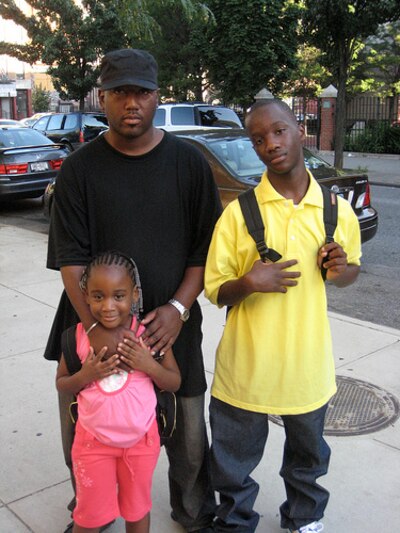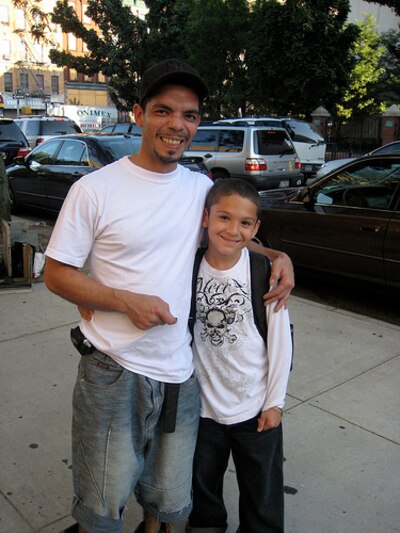
“If you know where your kids are, step up to your responsibilities and be a man,” Maurice Jordan, father of Shakim, 13, and Muneerah, 5, said this morning, as he accompanied his children to school. Fatherhood, he said, is “an easy job, it’s a fun job.” Jordan, who says he got custody of his children last year, believes his involvement in their education has led to academic success. “Between these two, I think it’s like thirty awards and certificates last year.”
To promote this kind of involvement, organizers from churches, community organizations, and the Office of Children and Family Services encouraged fathers — and other male relatives — to walk their children to school today as part of New York City’s Million Father March. The march, sponsored nationally by The Black Star Project, the Schott Foundation for Public Education, and other organizations, aimed to highlight the importance of fathers in their children’s education.
At C.S. 133 in Harlem, parents arriving with their children were greeted warmly by school administrators and teachers, event organizer Melvin Aston of the Office of Children and Family Services, and City Council Member Inez Dickens.
Dickens said that fathers must be encouraged to step out from their traditional behind-the-scenes roles and play a more public role in their children’s lives. “We need to show them, it’s all right for you to bring your child to school instead of the mother, it’s all right for you to bring them to a doctor’s appointment.” Both boys and girls benefit from having an involved father, she added.
The movement focused on one school in each borough this year, although fathers throughout the city were encouraged to walk their children to school, according to Deb Jenkins, Senior Pastor of the Faith @ Work Church, who organized the Bronx event.
“When a father is present, we see that the academic outcomes are greater,” Jenkins said. According to the National Fatherhood Initiative, nearly a third of American children live in “father-absent homes,” and the figure is close to 2 out of 3 for African American children. Studies show that children of involved fathers are less likely to drop out of school and more likely to get good grades.
She said that involving fathers can be hard, because they are often the primary breadwinner in the family and don’t feel they can take the time to visit school, or they aren’t present in the family at all. Jenkins was hoping for participation from at least 25 fathers of students at P.S. 153 in the Bronx. At C.S. 133, attendance by fathers was sparse; most children arrived with a female relative.

Still, the fathers who came were proud of their role. Reynaldo Cruz takes his son Juan, a fourth-grader, to school every day. “To me it just comes naturally,” said Cruz. “I can’t really judge other parents because they have jobs…. But I have a job, too, so if I can do it, they can do it.”
The movement to get fathers involved will not end with the march, said Jenkins. “We are taking the information of all participating fathers and pledging to assist them in any way throughout the year — economic referrals, navigating the public school system, activities for their children, and planning quarterly family-focused events.” By way of follow-up, fathers at C.S. 133 were invited to a cookout and “Personal Responsibility Forum” this evening at the Oberia Dempsey Multi-Service Center in Harlem, where they can find out about programs for children and families, employment opportunities, and other community services.
Daphne Jerimie, grandmother of Jaquan Jerimie, a second-grader at C.S. 133, said, “We have some devoted fathers, they’re here, rain, shine, like the mothers.” The march, she said, is “a nice start, to involve them and make them feel like they’re wanted, to let them know that we need them.”
